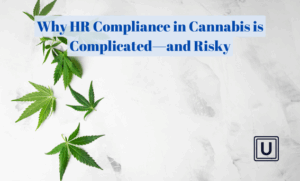
Cannabis Tax 101: Navigating 280E Challenges and Future Opportunities
Quick links
-
Introduction
-
Understanding IRS 280E
-
Implications of IRS 280E on Cannabis Businesses
-
Compliance Strategies for Navigating IRS 280E
-
Challenges Faced by Cannabis Businesses Under IRS 280E
-
Compliance Considerations and Best Practices
-
Strategies for Managing IRS 280E Constraints
-
Conclusion
1. Introduction
Navigating the cannabis industry’s tax landscape can feel like walking a tightrope, especially with the complexities of the IRS 280E tax code. Originally intended to curb deductions for illicit drug traffickers, 280E has become a significant challenge for state-legal cannabis businesses. It denies deductions for ordinary business expenses, leaving cannabis operators to shoulder a heavier tax burden compared to other industries.
This blog explores the intricacies of IRS 280E, its financial implications, and strategies to navigate its challenges effectively. Whether you’re a seasoned entrepreneur or new to the cannabis space, understanding this tax code is essential to staying compliant and optimizing your operations.
2. Overview: What is IRS 280E?
In the ever-evolving landscape of the cannabis industry, one regulatory aspect that significantly impacts businesses is the IRS 280E Tax Code. This section will provide an overview of IRS 280E, shedding light on its definition, purpose, and how it applies specifically to the cannabis industry.
1. Definition and Purpose of IRS 280E
The IRS 280E Tax Code provision was introduced as a response to the federal classification of cannabis as a Schedule I controlled substance. This provision restricts businesses engaged in the sale, cultivation, or distribution of controlled substances from deducting ordinary business expenses when calculating their federal taxable income, except for the cost of goods sold (COGS).
2. Background on its Application to the Cannabis Industry
The application of IRS 280E to the cannabis industry has been a point of contention for many business owners. Despite the legalization of cannabis for medical or recreational use in numerous states, the federal government still classifies it as illegal. Consequently, cannabis businesses are subject to the limitations imposed by IRS 280E, resulting in unique challenges and financial implications.
3. Key Provisions and Limitations
Under IRS 280E, cannabis businesses are unable to deduct common business expenses such as rent, employee salaries, marketing costs, and other typical operating expenses. This limitation significantly impacts the profitability and effective tax rates of cannabis businesses, as they are taxed on their gross income rather than their net income.
However, it’s important to note that while ordinary business expenses are disallowed, cannabis businesses can still deduct the cost of goods sold (COGS). The COGS refers to the direct expenses incurred in the production or acquisition of cannabis products, such as the cost of raw materials, direct labor, and directly related overhead costs.
Understanding the definition, purpose, and key provisions of IRS 280E lays the foundation for comprehending the implications, challenges, and compliance considerations that the cannabis industry faces. In the subsequent sections, we will explore these aspects in greater detail, providing valuable insights to help businesses navigate the complex tax landscape of the cannabis industry.
3. Implications of IRS 280E on Cannabis Businesses
IRS 280E significantly affects the financial health of cannabis businesses. Here’s how:
- Limited Tax Deductions: Ordinary business expenses such as marketing, rent, and salaries are non-deductible, increasing taxable income.
- Higher Effective Tax Rates: Businesses are taxed on gross profits rather than net, leading to substantial financial strain.
- Reduced Cash Flow: The inability to offset expenses limits reinvestment opportunities and operational growth.
4. Compliance Strategies for Navigating IRS 280E
Navigating the complexities of IRS 280E requires cannabis businesses to adopt proactive compliance strategies. Below are key approaches:
1. Accurate Record-Keeping
Maintain detailed documentation of all transactions, particularly those related to the Cost of Goods Sold (COGS). Properly categorized records can significantly reduce audit risks.
2. COGS Optimization
Focus on maximizing deductible COGS expenses, such as inventory costs and direct production-related expenses, while adhering to IRS guidelines.
3. Expert Guidance
Partner with tax professionals specializing in cannabis taxation. Their expertise ensures accurate compliance and strategic tax planning.
4. Invest in Technology
Use payroll and HR solutions like UZIO to automate compliance tracking and streamline processes. Learn more about automating payroll and compliance.
5. Stay Updated on Regulations
IRS and state tax laws are subject to change. Regularly review updates to ensure ongoing compliance.
5. Challenges Faced by Cannabis Businesses Under IRS 280E
Operating under IRS 280E presents unique hurdles for cannabis businesses. Below are the most pressing challenges:
1. Limited Tax Deductions
Businesses cannot deduct ordinary operating expenses, such as rent, salaries, and marketing costs, resulting in higher effective tax rates. This limitation significantly impacts profitability.
2. Strained Cash Flow
With increased tax liabilities and limited deductions, many cannabis businesses struggle with cash flow, making it harder to reinvest or scale operations.
3. Complexity in Financial Management
Accurately allocating expenses to COGS and maintaining compliance with shifting regulations requires meticulous financial planning and expertise.
4. Limited Access to Banking Services
Due to federal classification, cannabis businesses often face difficulties accessing traditional banking services, compounding their financial management issues.
5. Compliance Risks
Missteps in compliance, whether due to poor record-keeping or misclassification of expenses, can lead to audits, penalties, and further financial strain.
6. Compliance Considerations and Best Practices
Navigating IRS 280E successfully requires cannabis businesses to adopt proactive compliance strategies and best practices. Here’s how to stay ahead:
1. Maintain Detailed Records
Accurate and meticulous record-keeping is essential. Maintain documentation of all expenses, particularly those related to the cost of goods sold (COGS), as they are deductible.
2. Consult Tax Experts
Work with professionals who specialize in cannabis tax laws. Their expertise can help optimize your tax strategy while ensuring compliance.
3. Prioritize COGS Allocation
Carefully allocate eligible expenses to COGS. This includes costs directly tied to production, such as raw materials and labor. Proper categorization can significantly reduce tax liability.
4. Regularly Monitor Regulations
Stay informed about changes in federal and state tax laws. Regulations impacting IRS 280E can shift, and businesses must adapt promptly to maintain compliance.
5. Invest in Tax-Compliance Tools
Use advanced software solutions for accurate expense tracking, tax calculation, and reporting. Tools like UZIO’s payroll system can simplify compliance with tax codes while streamlining payroll and HR operations.
Recommended Reading: Biggest pain point with Payroll and HR software
7. Strategies for Managing IRS 280E Constraints
Overcoming the challenges posed by IRS 280E requires a combination of strategic planning, operational efficiency, and innovative approaches. Here are actionable strategies cannabis businesses can adopt:
1. Optimize Cost Allocation to COGS
Ensure all allowable expenses are correctly allocated to the Cost of Goods Sold (COGS). This may include expenses like cultivation, manufacturing, and direct labor. Proper allocation minimizes taxable income and reduces overall tax liability.
2. Focus on Operational Efficiency
Streamline operations to reduce costs and increase profitability. Evaluate processes for redundancies and invest in automation tools to improve productivity.
3. Evaluate Legal Entity Structures
Consider structuring your business in a way that allows separate entities for operations and management. This may provide strategic advantages in minimizing exposure to 280E.
4. Explore State Tax Credits and Incentives
Some states offer tax credits or deductions for cannabis businesses. Leverage these opportunities to offset your federal tax burden.
5. Build Reserves for Tax Payments
Given the higher effective tax rates under 280E, maintain robust financial reserves to cover tax liabilities. This ensures liquidity and avoids disruptions during tax season.
6. Partner with Specialized Accountants
Engage accountants and consultants with expertise in cannabis taxation. Their insights can help navigate legal complexities and optimize financial planning.
8. Conclusion and Call to Action
Navigating the complexities of IRS 280E can be challenging for cannabis businesses, but with strategic planning, operational efficiency, and expert guidance, compliance is achievable. By understanding the tax implications, implementing proactive measures, and leveraging tools like payroll and financial management software, businesses can mitigate risks and optimize profitability.
At UZIO, we understand the unique challenges faced by cannabis businesses. Our comprehensive payroll and HR solutions are designed to help you streamline operations, ensure compliance, and focus on growth. From automated tax filings to detailed reporting, our tools simplify the complexities of payroll and HR management for cannabis companies.
Take Action Today! Explore how UZIO can help your business navigate IRS 280E and beyond. Contact Us for a personalized consultation or schedule a demo to see our solutions in action.
To know more about UZIO payroll solution for the Cannabis Industry and get in touch with us for an expert-led demo.





